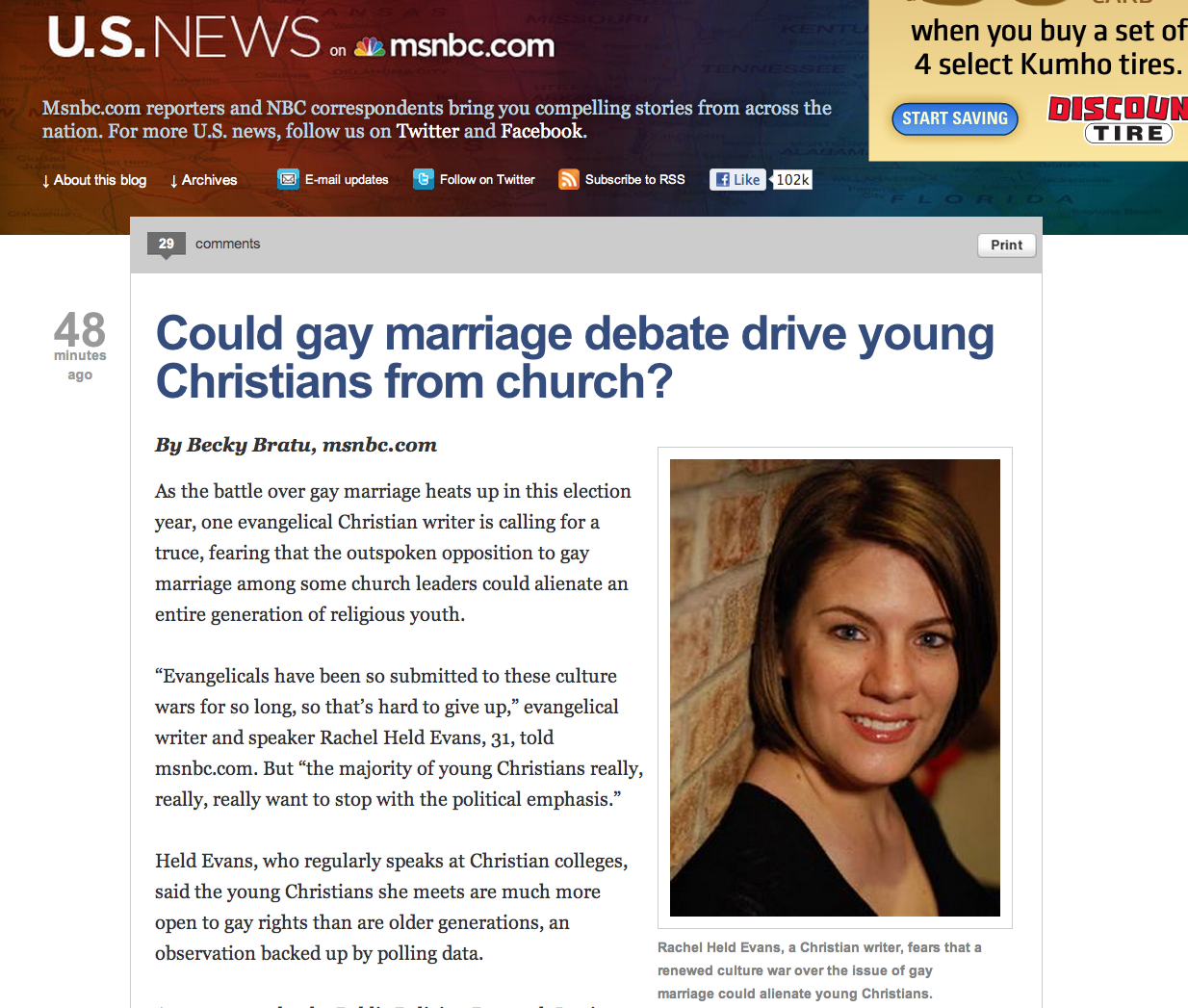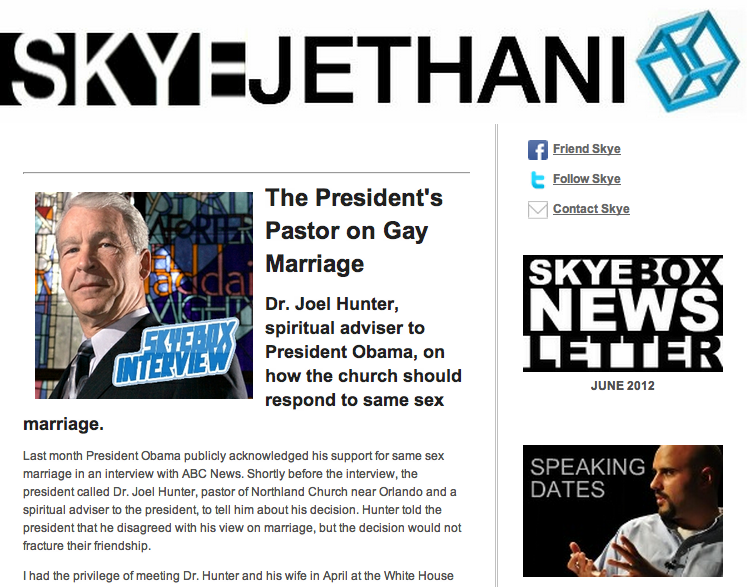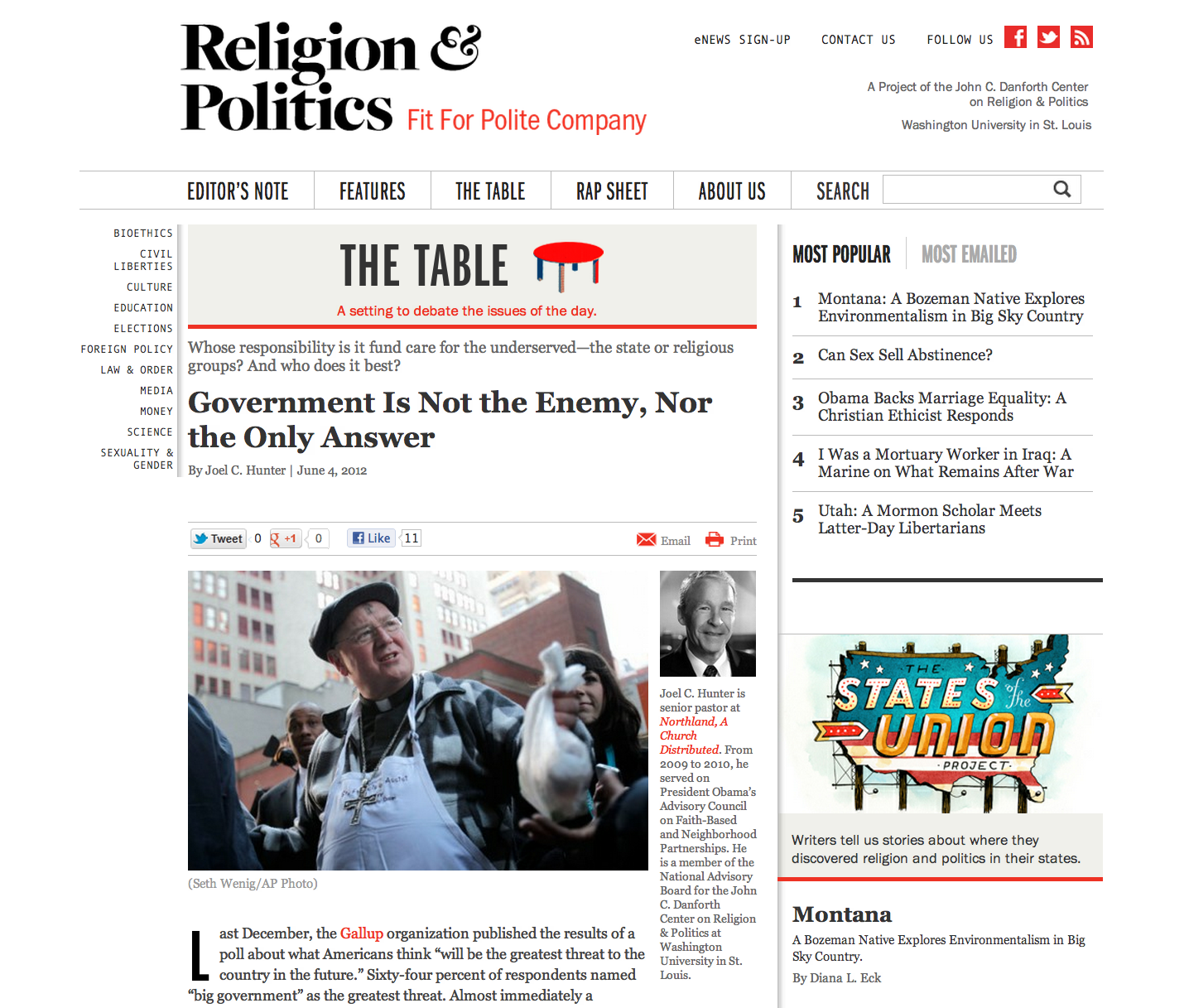 As the battle over gay marriage heats up in this election year, one evangelical Christian writer is calling for a truce, fearing that the outspoken opposition to gay marriage among some church leaders could alienate an entire generation of religious youth.
As the battle over gay marriage heats up in this election year, one evangelical Christian writer is calling for a truce, fearing that the outspoken opposition to gay marriage among some church leaders could alienate an entire generation of religious youth.
“Evangelicals have been so submitted to these culture wars for so long, so that’s hard to give up,” evangelical writer and speaker Rachel Held Evans, 31, told msnbc.com. But “the majority of young Christians really, really, really want to stop with the political emphasis.”
Held Evans, who regularly speaks at Christian colleges, said the young Christians she meets are much more open to gay rights than are older generations, an observation backed up by polling data.
A 2011 survey by the Public Religion Research Institute shows the generation gap between young Christians and their elders is large, with 44 percent of white evangelicals aged 18-29 in support of marriage equality compared to only 12 percent of those 65 and older.
According to the same survey, nearly 70 percent of young Christians also agree that religious groups are alienating young people by being too judgmental about gay and lesbian issues.
“For young Christians, having gay and lesbian friends is just a part of our life,” Held Evans said. “It’s just really hard for us to see them as mere issues to debate, because we’re talking about our friends here.”
The shift is manifesting itself increasingly on Christian college campuses, including at Biola University in California, where, about two months ago, an anonymous group of students announced the presence of the "Biola Queer Underground," asking that the LGBT community on campus “be treated with equality and respected as another facet of Biola's diversity."
At Wheaton College in Illinois, a group of alumni known as OneWheaton coalesced in 2011 to express its support of the LGBT community on campus.
“OneWheaton understands that LGBTQ issues are difficult to process at Wheaton College,” reads a statement from the group. “We desire this to change for current students and wish to create such an environment, a safe place for them to process these issues and develop into the people they are meant to be.” In response, school officials have said they are open to having a conversation about homosexuality on campus.
To Held Evans, American churches’ attitude toward gay rights will play an important role in the retention of young Christians. In an article she wrote following North Carolina’s recent vote to ban gay marriage, Held Evans points to data mentioned in David Kinnaman’s book You Lost Me, which shows that 59 percent of teens who were raised Christian abandon the church when they become adults. One of the main reasons, the article says, is the church’s attitude toward gay rights.
Fellow Christian writer Matthew Anderson, 30, agrees that there is a generational shift taking place in Christians’ support for gay rights, but he is less convinced it’ll lead to any profound changes in the near-term.
“Those of the conservative side aren’t going away. They’re just going to be a lot more careful in terms of how they frame their positions,” Anderson told msnbc.com.
He also doesn’t think younger Christians are going to embrace more liberal views on matters of sexuality, including homosexuality.
“There’s going to be a large, less vocal, at least a substantive minority – it’s not an outright majority – of younger evangelicals who are going to take a broadly conservative position on sexual ethics,” he said.
That position stems from the conviction that God defined marriage in the scripture as between a man and a woman, Anderson said, and Christians don’t believe they have the right to redefine it.
For thousands of years the definition of marriage has been the same, said Pastor Joel Hunter, a spiritual advisor to President Obama. “And so, there’s some reason for the apprehension that says this thing is moving so fast that I wonder what the next 10 years will hold,” he told msnbc.com.
In Hunter’s view, the word “marriage” cannot be used to characterize a same-sex union, but he believes having this debate on a national stage offers a unique opportunity.
“We really have an opportunity to raise the level of respect, to raise the dialogue to where no rights of one group trumps another group’s rights,” he said, adding: “The scripture has certain listed sins, and we want to dissuade people from those behaviors, because we think in the long run if it’s in scripture then that’s not something that God approves of.”
Hunter, who leads a Florida megachurch, said he believes the government could establish a kind of civil marriage, which would not fit within the definition of Biblical marriage.
”We don’t 100% equate this as a part of the civil rights movement because for us at least a part of this is a matter of choice, it’s a behavior, and so it’s a different category than skin pigmentation,” he said. “Having said that, we want to be sure that all Americans do have citizens’ rights to enter any legal relationship that they want to.”
But finding compromise appears unlikely, Anderson believes, as most players on the national stage treat the debate as a zero-sum game.
“It’s winner-take-all, and there’s sort of no middle ground between the two positions,” he said.
While young Christians may be divided on whether gay relationships should be celebrated in the church, Held Evans said, they’re increasingly unified on their stance against legislative action, such as North Carolina’s gay marriage ban and others that will be up for votes this fall.
“The majority of young Christians really, really, really want to stop with the political emphasis,” she said. “Even young Christians who think that gay relationships are not God’s design, a lot of them will still say ‘but I think it should be legal for gay people to get married, because this is America.’”
By Becky Bratu, msnbc.com
FIND THIS ARTICLE AT: http://usnews.msnbc.msn.com/_news/2012/07/02/12524736-could-gay-marriage-debate-drive-young-christians-from-church?lite




